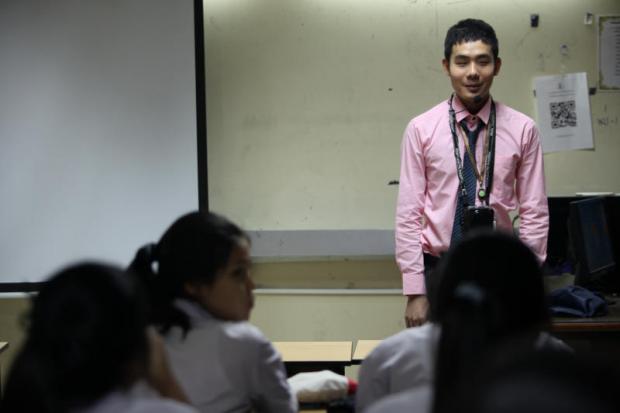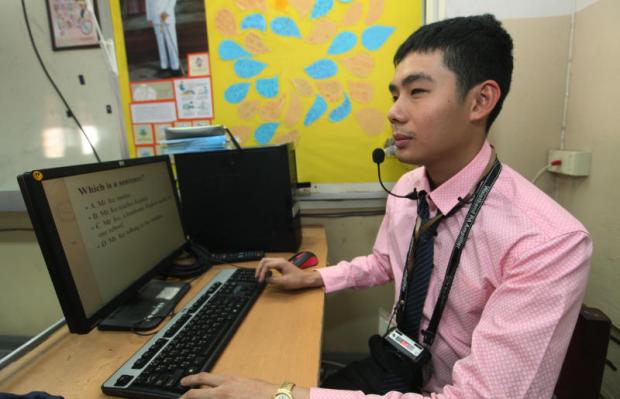
Damkerng Mungthanya might be visually impaired. But that doesn't hamper him from teaching English to high school students at Satri Si Suriyothai School, one of Bangkok's oldest public schools for girls.
An honour student from Chulalongkorn University, the now 26-year-old became an overnight YouTube sensation recently when his life story depicting his struggles to be accepted as a blind teacher in a mainstream school was first introduced in a Thai commercial to mark Thailand's Teachers' Day. The clip has so far garnered 5.6 million views and rising. Since then he has been invited by the media to share his story on a number of occasions to motivate others.
In his three years at Satri Si Suriyothai School, Damkerng -- better known among his pupils as Kru Ice -- has gained the respect and admiration of both his colleagues and students for his dedication and passion for teaching. A navy officer's eldest son, Damkerng, blind from birth, has always been a go-getter. Even so, the road to where he is today was far from smooth.
"While being blind never stopped me from reaching goals I set for myself in life, I faced a huge hurdle while studying at Chulalongkorn," he said. His passion to be an English teacher began in high school when he was approached by friends to tutor them in English.
From 1st to 6th grade, Damkerng studied at the School for the Blind in Bangkok, after which he received a scholarship to complete high school at St Gabriel's College where he studied alongside sighted students. There he formed a love for the English language.
Completing his high school with a top grade point average (GPA) of 3.85, Damkerng sat for the university entrance exams like the rest of the country and was accepted at Chulalongkorn University's Faculty of Education. He completed his Bachelor's degree with flying colours, a GPA of 3.95, despite a slew of obstacles from being blind.
"I was initially informed that the faculty would provide a braille printer for me," he recalled. "However, when I actually began studying there it was perpetually broken. I had to find more methods to get notes on the lectures I attended. I had to ask my professors for the Powerpoint file they used for the lessons, and then use screen-reading software to help me read. Thanks to technology I was able to understand my lessons."
But he wasn't always lucky. When just a hard copy was available, Damkerng had to scan each page of the text book and then use a reader programme. This entire process took him a couple of hours.
"While I am thankful for the helpful classmates and professors I had, the entire experience shed light on just how unprepared Thailand is in the ability to integrate their visually impaired citizens, or for that matter people with other disabilities, into society."
Damkerng credits his confidence and motivation to follow his purpose in life to supportive parents, teachers and colleagues who continue to drive him to reach greater heights.
"When I was at St Gabriel's, my teachers told me that I had the capability to do nearly everything an able-bodied person can do except, of course, to see. I always kept my grades up through devising a way to study cleverly, understanding how to practically use what I was being taught. I also read rags-to-riches success stories that further motivated me to not allow hurdles in life to dissuade me from following my dreams."

Pawat Laopaisarntaksin
When Damkerng first started his teaching career, no one thought he could be able to teach a class of sighted students. But it was the head teacher of the English department at Satri Si Suriyothai, Veena Ratanasumawong, who gave him the much-needed support, without which his teaching career would have been short-lived.
"Parents of the students were sceptical if their children would be able to learn from a blind teacher," he said. "I had to work doubly hard to prove my capabilities, but it was so worth it because the students have been exceptionally accommodating by caring for me. One student has even volunteered to walk with me from the BTS station to the school each morning and back to the station in the afternoon."
And his life story pulls the heart strings because it addresses how to face rejection.
"I have had to work harder in all aspects of being a teacher to prove my worth, and I am endlessly grateful for this opportunity. I want to show that my disability does not necessarily have to get in the way of being a good teacher."
Damkerng wants to use the success he has had on social media to campaign for people with disabilities to be given more opportunities to showcase their skills and talent at the workplace.
"I have found that some people judge others based on their disabilities rather than their abilities. I would like to use the platform I have today to help change this mindset. I want people to see me as an example. Thanks to technology, I as a blind person can teach a class of able-bodied students. However, if I did not get an opportunity to show my skills I would not be where I am today."
But when asked whether he would like to one day become a motivational speaker, he said: "Not really, I am more focused at present to motivate my students to reach for the stars. If I am able to accomplish that, I would be immensely happy."
Damkerng, who hopes to one day vie for a Fulbright scholarship, credits his mother for instilling in him the desire to reach for the impossible.
"Mom always says, 'Whatever you do in life, do it to the best of your ability'.
"At my lowest moment, my mom has always been there to pick me up. It is pivotal for parents who have children with disabilities to encourage them to not pity themselves but rather strive to become the best person they can become."
Damkerng knows just what he is talking about. In university, he worked hard to develop a well-rounded personality so others would find him more approachable. He continues to brush up on his teaching skills to keep his students interested and eager to learn.
His biggest desire is to see people with disabilities become better assimilated into Thai society.
"I opted to not teach at the blind school partly because I have always desired to promote inclusive education. Today many blind students study in mainstream schools and inclusive education systems, where you can see teachers and students who are the able-bodied and disabled study together," said Damkerng.
"My hope is that I am setting a good example for other blind students to follow their dream."